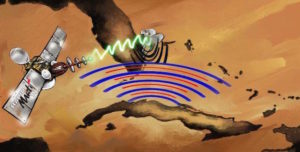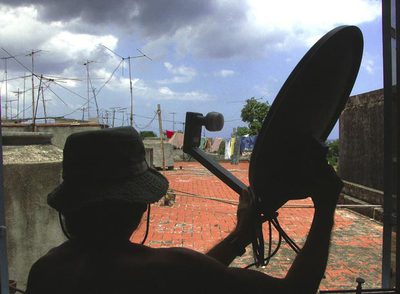 TRANSMITIRAN A TRAVES DE NUEVO SATELITE EMISIONES DE RADIO TV MARTI A CUBA.
TRANSMITIRAN A TRAVES DE NUEVO SATELITE EMISIONES DE RADIO TV MARTI A CUBA.
La Oficina de Transmisiones a Cuba (OCB), que administra las emisiones de Radio TV Martí, estableció un contrato con una compañía de telecomunicaciones de Miami para enviar sus producciones en vivo, archivos de audio videos y documentos digitales a la audiencia en la isla.
De acuerdo con documentos oficiales revelados por el sitio Cuba Money Project, la iniciativa costará $558 mil dólares a los contribuyentes estadounidenses con el fin de mejorar “la experiencia visual para los espectadores y oyentes clandestinos”. El proyecto será puesto en marcha el próximo 1 de agosto, indica el contrato.
La empresa contratada es United Teleports, ubicada en el noroeste de Miami, la cual proveerá “un servicio satelital único” que permitirá a OCB “distribuir archivos y video en vivo” por toda Cuba, según muestra una declaración de intenciones.
El aviso señala que se decidió contratar con la compañía de Miami después de hacer una “evaluación integral” de una “propuesta no solicitada” que la firma presentó.
Según las referencias en su página digital, United Teleports proporciona servicios innovadores y personalizados a las emisoras de televisión por cable, satélite, Internet/OTT, terrestres y proveedores de telecomunicaciones en Estados Unidos, América Latina y el Caribe a precios más bajos, con mayor confiabilidad y con tiempos de inicio mucho más rápidos que los que pueden ofrecer sus competidores.
Creada en 2010, la empresa asegura que su personal operativo “es plenamente competente en la prestación de estos servicios con una alta fiabilidad y tiempo de respuesta utilizando un enfoque genuinamente personalizado”.
United Teleports tendrá que establecer un sistema que facilite una “forma única de entregar los archivos junto con la transmisión de vídeo”. Los datos están incrustados y no son visibles fuera de la estructura controlada”.
El sistema permitirá el uso de un satélite Eutelsat 65A “para facilitar el ocultamiento de la antena local”.
Los canales se entregarán “a través de la red Wifi multicast o cableada, así como de la salida de vídeo en banda base de los receptores”.
“El tamaño exacto de la antena tendrá que ser probado y aprobado con muestras locales para una definición exacta”, agrega la documentación.
La argumentación de OCB destaca que el contratista tiene una amplia experiencia en la transición de servicios de proveedores internos o de terceros a su entorno de distribución. “Esto incluye la migración de grandes volúmenes de contenido y la garantía de que los servicios se mantengan en el aire durante la transición”, añade el dossier de contratación.
COSTO DEL NUEVO SERVICIO A CUBA.
La OCB envía transmisiones satelitales en vivo las 24 horas a Cuba y tiene un presupuesto anual de $29 millones de dólares.
Sin embargo, la contratación de United Teleports se produce en momentos en que el Congreso se encamina a aprobar el presupuesto para el año fiscal 2020, que recorta los fondos para Radio TV Martí a $12.9 millones. De aprobarse esta reducción, la entidad tendría que cortar casi la mitad del centenar de empleados federales que laboran allí, además de afectar la contribución de unos 40 contratistas.
Una reciente auditoría sobre su programación, encargada por el gobierno federal, concluyó que la emisora difunde “informaciones plagadas de mal periodismo” y de “propaganda ineficaz” hacia la isla. Las razones de la inversión se explican en la descripción del contrato laboral como una necesidad imperiosa de la entidad federal.
“El cambio a un nuevo satélite en este momento es necesario ya que necesitamos mejorar la experiencia visual para los espectadores y oyentes clandestinos en la República de Cuba que reciben el contenido de OCB TV”, indica el texto. Agrega el documento que “esto se basaría en gran medida en el éxito que la OCB ha tenido en los últimos seis años para transmitir el mensaje fundamental de nuestra misión al pueblo de la República de Cuba”.
RECEPCION DE LA NUEVA SEÑAL.
United Teleports recibirá señales OCB de Miami y Washington, D.C., a través de Internet, y las pondrá a disposición de los usuarios de Cuba que lo soliciten. La compañía proveería un canal de vídeo, un canal de datos y dos canales de audio.
La descripción del plan de OCB indica que los usuarios necesitarían una antena parabólica de al menos 18 pulgadas o una antena parabólica para recibir la señal. Una característica importante del servicio, dice el reporte de OCB, es que “los usuarios podrían esconder sus platos o antenas de la vista de la gente en la calle”. OCB dice que “requiere la capacidad de encriptar la programación en ciertos momentos. En otras ocasiones amerita programación Free To Air (FTA)”.
United Teleports deberá proporcionar la capacidad para que Radio TV Martí pueda activar y desactivar el cifrado desde el origen del programa de OCB en Miami a su entera discreción. Esta señal pasará a través de la puerta de enlace del Contratista y posteriormente se conectará a la red sin ninguna intervención o interrupción de la señal de radiodifusión, señala el contrato.
El nuevo satélite entraría en funciones apenas días después de que el gobierno cubano de luz verde a la creación de redes inalámbricas privadas de transmisión de datos y la importación de equipos de transmisión hasta ahora vetados en el país, a partir del 29 de julio. Las medidas, recogidas en sendas resoluciones del Ministerio de las Comunicaciones, buscan “ordenar las redes privadas de datos y los sistemas inalámbricos de alta velocidad”.
 RADIO-TV MARTI WILL TRANSMIT THROUGH NEW SATELLITE EMISSIONS TO CUBA.
RADIO-TV MARTI WILL TRANSMIT THROUGH NEW SATELLITE EMISSIONS TO CUBA.
The Office of Transmissions to Cuba (OCB), which manages Radio TV Martí’s broadcasts, established a contract with a Miami telecommunications company to send their live productions, audio video files and digital documents to the audience on the island.
According to official documents revealed by the Cuba Money Project site, the initiative will cost the US $ 558,000 to the American taxpayers in order to improve “the visual experience for the spectators and clandestine listeners”. The project will be launched on August 1, indicates the contract.
The contracted company is United Teleports, located in northwestern Miami, which will provide “a unique satellite service” that will allow OCB “to distribute files and live video” throughout Cuba, according to a statement of intent.
The notice states that it was decided to contract with the Miami company after making a “comprehensive evaluation” of an “unsolicited proposal” that the firm submitted.
According to the references on its digital page, United Teleports provides innovative and personalized services to cable television, satellite, Internet / OTT, terrestrial and telecommunications providers in the United States, Latin America and the Caribbean at lower prices, with higher Reliability and with start times much faster than those that can offer their competitors.
Created in 2010, the company ensures that its operational staff “is fully competent in providing these services with high reliability and response time using a genuinely personalized approach.”
United Teleports will have to establish a system that provides a “unique way to deliver the files along with the video transmission”. The data is embedded and not visible outside the controlled structure. ”
The system will allow the use of a Eutelsat 65A satellite “to facilitate the concealment of the local antenna”.
The channels will be delivered “through the multicast or wired Wifi network, as well as the baseband video output of the receivers”.
“The exact size of the antenna will have to be tested and approved with local samples for an exact definition,” the document adds.
The argument of OCB emphasizes that the contractor has extensive experience in the transition of services from internal or third-party suppliers to their distribution environment. “This includes the migration of large volumes of content and the guarantee that services remain in the air during the transition,” adds the recruitment dossier.
COST OF THE NEW SERVICE TO CUBA.
The OCB sends live satellite transmissions 24 hours a day to Cuba and has an annual budget of $ 29 million dollars.
However, the hiring of United Teleports comes at a time when Congress is on track to approve the budget for the fiscal year 2020, which cuts funds for Radio TV Martí to $ 12.9 million. If this reduction is approved, the entity would have to cut almost half of the hundred federal employees who work there, in addition to affecting the contribution of some 40 contractors.
A recent audit of its programming, commissioned by the federal government, concluded that the station broadcasts “information plagued by bad journalism” and “ineffective propaganda” towards the island. The reasons for the investment are explained in the description of the labor contract as an urgent need of the federal entity.
“The change to a new satellite at this time is necessary as we need to improve the visual experience for the audience and clandestine listeners in the Republic of Cuba who receive the content of OCB TV,” the text states. The document adds that “this would be based to a large extent on the success that the OCB has had in the last six years to transmit the fundamental message of our mission to the people of the Republic of Cuba.”
RECEPTION OF THE NEW SIGNAL.
United Teleports will receive OCB signals from Miami and Washington, D.C., through the Internet, and will make them available to Cuban users who request it. The company would provide a video channel, a data channel and two audio channels.
The description of the OCB plan indicates that users would need a satellite dish of at least 18 inches or a satellite dish to receive the signal. An important feature of the service, says the OCB report, is that “users could hide their dishes or antennae from the eyes of people on the street.” OCB says that “it requires the ability to encrypt the programming at certain times, and at other times it deserves Free To Air (FTA) programming.”
United Teleports must provide the ability for Radio TV Martí to activate and deactivate encryption from the origin of the OCB program in Miami at its sole discretion. This signal will pass through the Contra’s gateway
Agencies/ DDC/ Internet Photos/ Arnoldo Varona/ www.TheCubanHistory.com
THE CUBAN HISTORY, HOLLYWOOD.



 < RADIO-TV MARTI will Transmit Through New Satellite Emissions to Cuba.
< RADIO-TV MARTI will Transmit Through New Satellite Emissions to Cuba.







